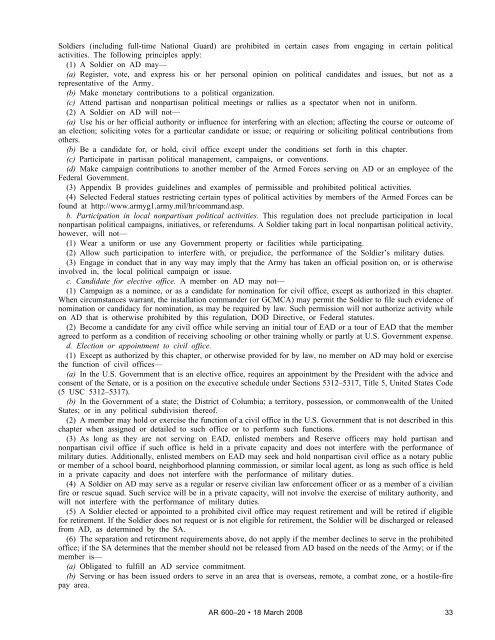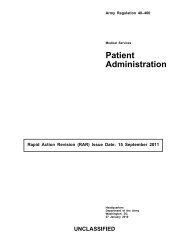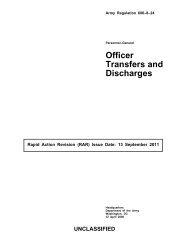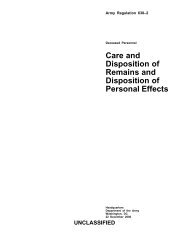AR 600-20, Army Command Policy - Army Publishing Directorate ...
AR 600-20, Army Command Policy - Army Publishing Directorate ...
AR 600-20, Army Command Policy - Army Publishing Directorate ...
Create successful ePaper yourself
Turn your PDF publications into a flip-book with our unique Google optimized e-Paper software.
Soldiers (including full-time National Guard) are prohibited in certain cases from engaging in certain political<br />
activities. The following principles apply:<br />
(1) A Soldier on AD may—<br />
(a) Register, vote, and express his or her personal opinion on political candidates and issues, but not as a<br />
representative of the <strong>Army</strong>.<br />
(b) Make monetary contributions to a political organization.<br />
(c) Attend partisan and nonpartisan political meetings or rallies as a spectator when not in uniform.<br />
(2) A Soldier on AD will not—<br />
(a) Use his or her official authority or influence for interfering with an election; affecting the course or outcome of<br />
an election; soliciting votes for a particular candidate or issue; or requiring or soliciting political contributions from<br />
others.<br />
(b) Be a candidate for, or hold, civil office except under the conditions set forth in this chapter.<br />
(c) Participate in partisan political management, campaigns, or conventions.<br />
(d) Make campaign contributions to another member of the Armed Forces serving on AD or an employee of the<br />
Federal Government.<br />
(3) Appendix B provides guidelines and examples of permissible and prohibited political activities.<br />
(4) Selected Federal statues restricting certain types of political activities by members of the Armed Forces can be<br />
found at http://www.armyg1.army.mil/hr/command.asp.<br />
b. Participation in local nonpartisan political activities. This regulation does not preclude participation in local<br />
nonpartisan political campaigns, initiatives, or referendums. A Soldier taking part in local nonpartisan political activity,<br />
however, will not—<br />
(1) Wear a uniform or use any Government property or facilities while participating.<br />
(2) Allow such participation to interfere with, or prejudice, the performance of the Soldier’s military duties.<br />
(3) Engage in conduct that in any way may imply that the <strong>Army</strong> has taken an official position on, or is otherwise<br />
involved in, the local political campaign or issue.<br />
c. Candidate for elective office. A member on AD may not—<br />
(1) Campaign as a nominee, or as a candidate for nomination for civil office, except as authorized in this chapter.<br />
When circumstances warrant, the installation commander (or GCMCA) may permit the Soldier to file such evidence of<br />
nomination or candidacy for nomination, as may be required by law. Such permission will not authorize activity while<br />
on AD that is otherwise prohibited by this regulation, DOD Directive, or Federal statutes.<br />
(2) Become a candidate for any civil office while serving an initial tour of EAD or a tour of EAD that the member<br />
agreed to perform as a condition of receiving schooling or other training wholly or partly at U.S. Government expense.<br />
d. Election or appointment to civil office.<br />
(1) Except as authorized by this chapter, or otherwise provided for by law, no member on AD may hold or exercise<br />
the function of civil offices—<br />
(a) In the U.S. Government that is an elective office, requires an appointment by the President with the advice and<br />
consent of the Senate, or is a position on the executive schedule under Sections 5312–5317, Title 5, United States Code<br />
(5 USC 5312–5317).<br />
(b) In the Government of a state; the District of Columbia; a territory, possession, or commonwealth of the United<br />
States; or in any political subdivision thereof.<br />
(2) A member may hold or exercise the function of a civil office in the U.S. Government that is not described in this<br />
chapter when assigned or detailed to such office or to perform such functions.<br />
(3) As long as they are not serving on EAD, enlisted members and Reserve officers may hold partisan and<br />
nonpartisan civil office if such office is held in a private capacity and does not interfere with the performance of<br />
military duties. Additionally, enlisted members on EAD may seek and hold nonpartisan civil office as a notary public<br />
or member of a school board, neighborhood planning commission, or similar local agent, as long as such office is held<br />
in a private capacity and does not interfere with the performance of military duties.<br />
(4) A Soldier on AD may serve as a regular or reserve civilian law enforcement officer or as a member of a civilian<br />
fire or rescue squad. Such service will be in a private capacity, will not involve the exercise of military authority, and<br />
will not interfere with the performance of military duties.<br />
(5) A Soldier elected or appointed to a prohibited civil office may request retirement and will be retired if eligible<br />
for retirement. If the Soldier does not request or is not eligible for retirement, the Soldier will be discharged or released<br />
from AD, as determined by the SA.<br />
(6) The separation and retirement requirements above, do not apply if the member declines to serve in the prohibited<br />
office; if the SA determines that the member should not be released from AD based on the needs of the <strong>Army</strong>; or if the<br />
member is—<br />
(a) Obligated to fulfill an AD service commitment.<br />
(b) Serving or has been issued orders to serve in an area that is overseas, remote, a combat zone, or a hostile-fire<br />
pay area.<br />
<strong>AR</strong> <strong>600</strong>–<strong>20</strong> 18 March <strong>20</strong>08<br />
33
















